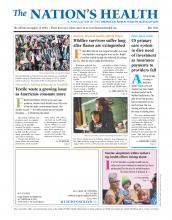Arizona advocates for vaccine policies
The federal Vaccines for Children program has one core mission: to get vaccinations to kids who might not otherwise receive them. But in Arizona, that work hit a snag: Vaccination rates for children who were eligible for the program were declining, while rates for other children remained stable.
Thanks to the work of the Arizona Public Health Association and its partners — who identified what was causing the problem and took action to remedy it — the vital service is now heading back on course.
To achieve its goals, the Vaccines for Children program partners with local physicians to administer free vaccines to their low-income patients. Health care providers order the vaccines through their state immunization program, which receives them at a discounted price.
Unfortunately, the number of physicians participating in the program had dropped dramatically, falling by half from 2015 to 2022. A survey found providers were unhappy with regulations set by the state department of health, including a fine for unused vaccine doses.
The Arizona Public Health Association took action, advocating for policy changes, reaching out to the press and organizing a “vaccine congress.”
Last year, the work paid off: The state health department released sweeping policy changes, such as eliminating the fine, allowing electronic record keeping and adjusting office hour requirements.
“These new policy changes, if implemented consistently, have a chance at rebuilding and enhancing Arizona’s VFC program and ensuring more children can access crucial vaccinations,” Will Humble, MPH, the association’s executive director, said on his blog.
For more information, visit https://azpha.org.
New Jersey adopts racism declaration
The New Jersey Public Health Association recently took action to address racial inequities that have contributed to significant health disparities throughout the state.

The New Jersey Public Health Association is planning to collaborate with partner organizations to encourage the adoption of its new racism declaration across the state. The declaration recognizes the role of social determinants of health, including economic stability, education, health care and public safety.
Photo by Alvarez, courtesy iStockphoto
NJPHA has joined an expanding group of national, local and state organizations who acknowledge racism as a public health crisis. In July, the association formally adopted a policy recognizing racism as a public health issue, following a unanimous vote by both its executive board and general body.
The final policy took more than a year to develop. The end product includes an 11-page policy that recognizes the role of social determinants of health, with a focus on economic stability, education, health care access and neighborhood safety. The policy advocates for reviewing internal systems, policies and practices through a racial equity lens to promote justice, equity, diversity, inclusion and belonging.
Future plans include collaborating with partner organizations to encourage the adoption of the policy across the state, according to NJPHA President Sreelekha Prakash MD, MPH.
For more information, visit www.njpha.org.
Kansas innovates with new program
Participation in APHA’s affiliated state and local health associations can bring a career boost to public health professionals. A new certificate program from the Kansas Public Health Association provides members with an impressive addition to their resumes and cover letters.
The Advocate and Champion Certificate Program, launched in 2024, recognizes the contributions of members to building a healthier community and promotes civic engagement of the public health workforce.
Members log volunteer activities to accumulate points toward their certificate. The point system rewards them based on their degree of civic engagement.
Activities such as calling a state senator or representative or sharing KPHA social media posts can earn five points. Participating in local advocacy activities or serving in a KPHA committee is rewarded with 15 points. And 25 points are awarded for serving on a KPHA board.
When members accumulate a total of 50 points, they earn the Advocate Certificate. With 75 points, members receive the highest recognition: the Champion Certificate. The first Champion Certificates was awarded to APHA member Shelby Ostrom, MPS, who submitted 185 points, in October.
For more information, visit https://kpha.us.
- Copyright The Nation’s Health, American Public Health Association









